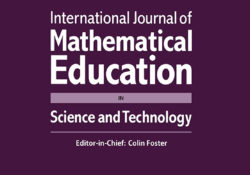tandfonline.com har udgivet en rapport under søgningen „Teacher Education Mathematics‟: Using a lecture-oriented flipped classroom in a proof-oriented advanced mathematics course Link til kilde
Like this:
Like Loading...

tandfonline.com har udgivet en rapport under søgningen „Teacher Education Mathematics‟: ABSTRACT ABSTRACT The present study examined the 2015 Trends in International Mathematics and Science Study “Advanced” data to examine how the educational credentials of maths teachers and other teacher characteristics were related to attitude towards advanced mathematics and perceptions of engaged teaching among 12th-grade students enrolled in advanced mathematics courses in the U.S. As attitudinal outcomes in this study, two measures of attitude towards mathematics were employed – the Students Like Learning Advanced Mathematics scale and the Students Value Advanced Mathematics scale, and one measure of student perception of engaged teaching – the Students’ Views on Engaging Teaching in Advanced Mathematics Lessons. A set of multilevel regression analyses were conducted predicting each of these aforementioned outcomes. No statistically significant effects… Continue Reading →
Like this:
Like Loading...
eric.ed.gov har udgivet: Numerous studies document high drop-out and failure rates for students in computer programming classes. Studies show that even when some students pass programming classes, they still do not know how to program. Many factors have been considered to explain this problem including gender, age, prior programming experience, major, math background, personal attributes, and the programming language itself. Research in this area has mainly been confined to introductory programming courses. This study explores the problem at a higher level. It tracks students longitudinally as they move from the first introductory programming class, to the second introductory class, and finally, to completion of an advanced programming course. The research question answered was: What are the factors contributing to the success or lack of success in advanced programming? The success… Continue Reading →
Like this:
Like Loading...
eric.ed.gov har udgivet: Several avenues are open to students who wish to study advanced science or mathematics in high school, which include Advanced Placement courses and teacher-designed courses unaffiliated with organized programs. We employ a retrospective cohort study of 4,691 nationally representative college students at 34 randomly selected, colleges and universities to examine the relationship between taking advanced high school courses and students‛ interest in pursuing a STEM career, while controlling for prior interests and experiences. We are able to distinguish between those students choosing to take an additional year in a science or math subject from those taking Advanced Placement (AP), which is most commonly taken as a second year course, but is increasingly taken as a first year course. We find that the number of years of a… Continue Reading →
Like this:
Like Loading...
tandfonline.com har udgivet en rapport under søgningen „Teacher Education Mathematics‟: ABSTRACT ABSTRACT This paper takes the concept of pedagogical content knowledge (PCK), which is well known in teacher education, and applies it in research methods education where it has not been previously used. It asks how experienced social science research methods teachers, who know their subject (method) well, teach advanced social research methods to others. Drawing on a wider, multi-method qualitative study conducted in the UK, the paper shows the participating teachers’ orientation to teaching methods and how they combine knowledge of content and pedagogy in generic and distinctive PCK. It shows specifically their use of data for translating methods to become readily knowable for students. The case is made for identifying PCK through dialogic means as a vehicle for… Continue Reading →
Like this:
Like Loading...
eric.ed.gov har udgivet: Everyone knows that there is racial inequality in achievement returns from advanced math; however, they do not know why black students and white students taking the same level of math courses are not leaving with the same or comparable skill levels. To find out, the author examines variation in course coverage by the racial composition of the classroom. She hypothesizes that content coverage varies by classroom composition, because teachers respond to the needs and abilities of their students and make adjustments to teaching. More specifically, she asks: (1) Within advanced math courses with the same title, to what extent does content coverage breadth vary by classroom minority composition; (2) Within advanced math courses with the same title, to what extent does content coverage depth vary by classroom… Continue Reading →
Like this:
Like Loading...
tandfonline.com har udgivet en rapport under søgningen „Teacher Education Mathematics‟: ABSTRACT Formulae display:?Mathematical formulae have been encoded as MathML and are displayed in this HTML version using MathJax in order to improve their display. Uncheck the box to turn MathJax off. This feature requires Javascript. Click on a formula to zoom. ABSTRACT This study shows that using authentic contexts for learning differential equations in a differentiation-by-interest setting can enhance students’ beliefs about the relevance of mathematics. The students in this study were studying advanced mathematics (wiskunde D) at upper secondary school in the Netherlands. These students are often not aware of the relevance of the mathematics they have to learn in school. More insights into the application of mathematics in other sciences can be beneficial for these students in terms… Continue Reading →
Like this:
Like Loading...



